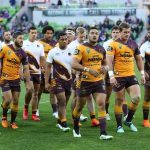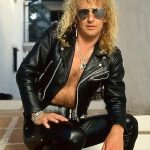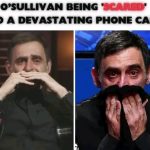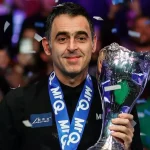When the dusk fell over Warsaw’s PGE Narodowy Stadium on June 15th, the sky turned an ominous shade of bruised purple, as if it too was bracing for the thunderous metal storm about to erupt. Thirty-five years after Painkiller first scorched the heavy metal landscape, Judas Priest had come to Poland to celebrate it in a way that felt more like a holy rite than a concert.
Outside the stadium gates, thousands gathered, clad in patched denim vests, black leather jackets gleaming under streetlights, fists clenched around beers and banners that bore the winged figure of the metallic angel—Painkiller personified. Some fans were older than the album itself, their hair now more salt than pepper, but their eyes burned with the same molten fire that Painkiller had sparked in them back in 1990. Others were teens, born decades after the record’s release, yet here to worship at the altar of roaring riffs and banshee screams.
Inside the stadium, the crew moved like ants beneath an iron colossus of lights, pyrotechnics, and speakers stacked like monoliths. Onstage, a towering replica of the Painkiller angel straddled a chrome motorcycle that jutted out over the first rows like a threat and a promise. Rob Halford, now seventy-three but still radiating the aura of a battle-hardened warlord, emerged from backstage clad in a floor-length silver trench coat that shimmered every time the stage lights caught it.
He didn’t speak as he took his place center stage. He didn’t have to. The band launched straight into the opening shriek of “Painkiller,” Scott Travis hammering out that legendary drum assault as if he were forging the very gates of hell open, riff by riff, beat by beat. The crowd erupted—tens of thousands of fists thrust skyward, the roar of voices threatening to drown out the wall of Marshall amps.
In the front row, Marta Zielinska, thirty-two, a lifelong Priest fan, screamed the chorus until her voice cracked. She had traveled from Kraków with her younger brother, Tomek, who at seventeen was seeing Judas Priest for the first time. For Tomek, Painkiller had been a revelation—an ancient relic unearthed on his father’s dusty CD shelf during a gloomy lockdown winter. He had looped the title track for days until he knew every shriek, every squeal, every machine-gun riff by heart.
When Halford reached the final, lung-scorching “Pain… KILLERRRR!” Marta turned to her brother, grinning like a child seeing fireworks for the first time. He beamed back, hair plastered to his forehead with sweat and spilled beer, eyes wide with the sheer immensity of it all.
After “Painkiller,” the band dug deep into the anniversary setlist. They played the entire album front to back—“Hell Patrol” rumbled with tank-like menace, “Leather Rebel” had the entire stadium chanting as one, “Metal Meltdown” poured molten steel from K.K. Downing’s flying V guitar. Glenn Tipton, long retired from touring due to Parkinson’s, surprised everyone by appearing for “Night Crawler,” emerging from a rising platform shrouded in dry ice like some spectral conjuror. The stadium went silent for a heartbeat before detonating in a deafening roar.
Between songs, Halford spoke to the crowd in short bursts of Polish, each phrase met with thunderous cheers. “Dziękujemy, Polska!” he bellowed, raising a studded fist skyward. “You have kept the fire alive!”
The final song before the encore was “One Shot at Glory.” By then, the entire stadium had transformed into a single living beast—horned hands reaching skyward, heads banging in perfect synchrony, the concrete stands vibrating beneath stomping boots. Marta felt it in her bones, a pulse older and stronger than any worry that waited for her back home. In that moment, everyone in the crowd was immortal.
Backstage, after the main set ended, Halford sat on a battered flight case, towel draped over his shoulders, sipping ginger tea between deep breaths. Richie Faulkner, sweat pouring down his arms, grinned at him.
“You gonna bring out the old Harley tonight?” Richie asked, gesturing to the chrome beast that waited just offstage—a faithful recreation of the bike Halford rode onto countless stages during Painkiller tours decades ago.
Halford just chuckled. “You think Poland’s ready for that roar one more time?”
When the lights dimmed again for the encore, the crowd was already chanting: Priest! Priest! Priest! The Harley’s engine snarled to life like a chained animal finally freed. The audience howled as Halford, now clad in spiked black leather, rolled onto the stage astride the growling machine.
They closed the night with “Breaking the Law” and “Living After Midnight,” a tribute not just to Painkiller, but to the decades of rebellion, sweat, and brotherhood that Judas Priest had forged across generations.
As the last chords faded and fireworks turned the Warsaw sky into a canvas of red and gold, Marta looked at her brother, her eyes wet but her grin defiant. “Next year,” she shouted over the fading echoes, “we follow them to Wacken!”
Tomek just nodded, voice gone, heart pounding, the promise of a thousand more nights like this burning in his chest.
Long after the stadium lights went dark, echoes of Painkiller still rumbled through the streets of Warsaw. Outside, fans spilled onto the avenues, humming riffs, swapping stories, holding tight to that fleeting immortality only Judas Priest could conjure—an unbreakable bond of leather, metal, and thunder that would roar on for generations yet to come.
Long l
ive the Metal Gods. Long live Painkiller.









